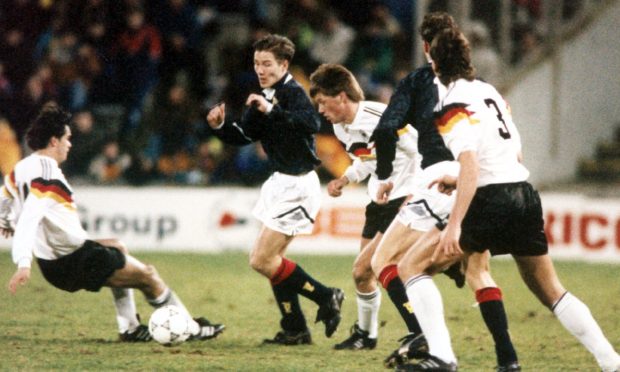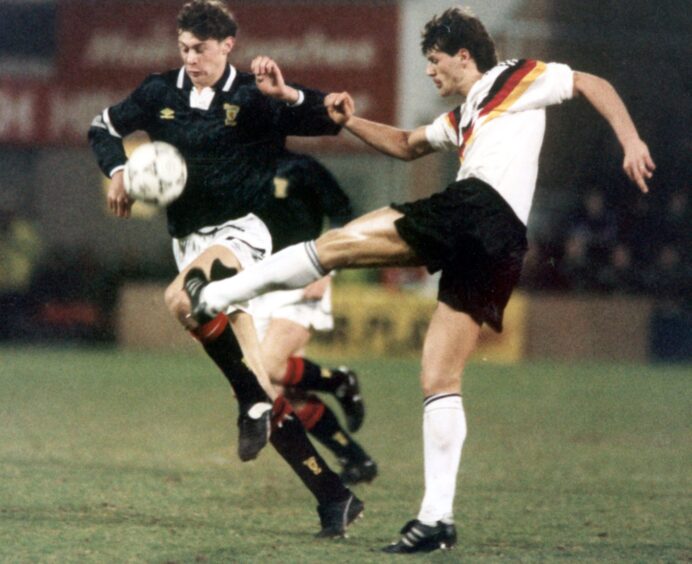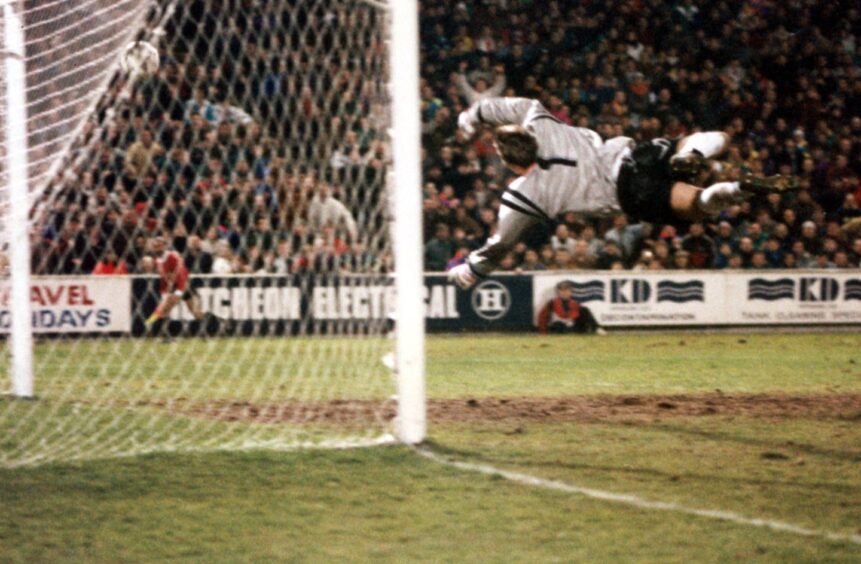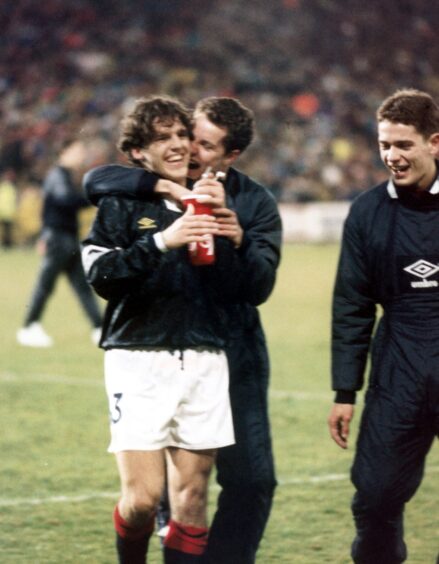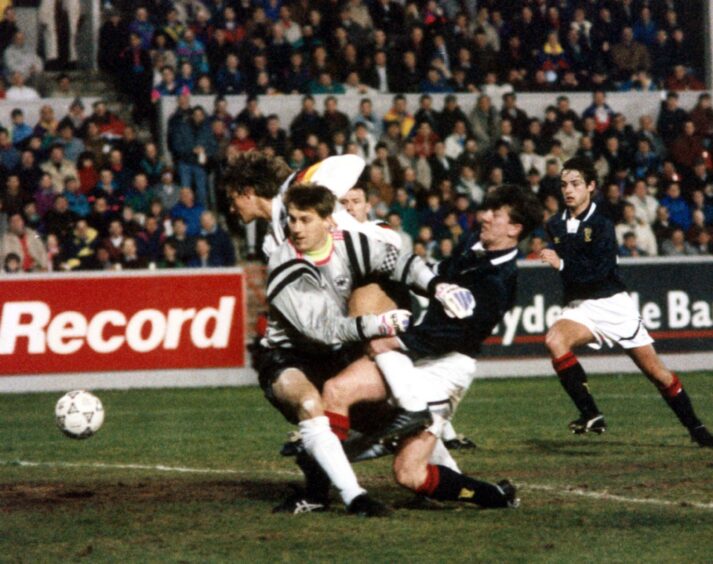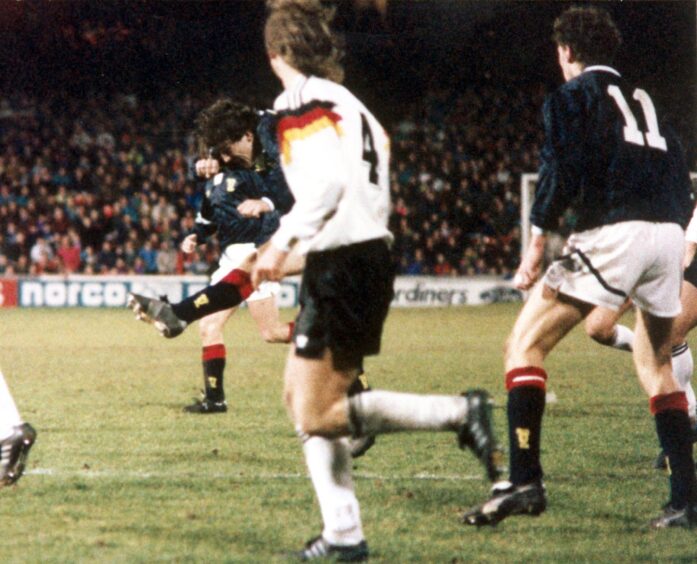Scotland will take on Germany in the opening match of Euro 2024 in Munich on Friday evening but arguably the most entertaining match between the two countries took place in Aberdeen.
More than 22,000 fans packed into Pittodrie to watch Scotland under-21s take on their German counterparts for a place in the last four of the European Championships on March 24, 1992.
In a thrilling encounter, Craig Brown’s young Scots came from 3-1 down to win 4-3 thanks to Alex Rae’s late winner.
The Scots, who had drawn 1-1 in Bochum in the first leg, went on to face Sweden in the final four of the competition. A 0-0 draw in the first leg at Pittodrie was followed by a 1-0 loss in Sweden.
But the victory against the Germans went down in folklore as a memorable night at Pittodrie.
The Scotland starting line-up contained four Aberdeen players – goalkeeper Michael Watt, defenders Stephen Wright and Gary Smith and attacking midfielder Eoin Jess.
Action-packed encounter
The Press and Journal’s match report described Scotland’s win against Germany as “probably the greatest fightback staged by any Scottish team” in a “quite incredible match”.
It looked like a German side containing Stefan Klos, Mehmet Scholl and Gerhard Poschner was heading for a comfortable victory when they went 3-1 up but Brown’s side refused to give in.
Markus Kranz opened the scoring for the Germans after nine minutes before Scholl shot powerfully beyond Watt in the 41st minute to double the advantage.
Ray McKinnon reduced the deficit two minutes later when he pounced on a rebound after Gerry Creaney had been thwarted by Klos.
Germany made it 3-1 through Heiko Herrlich just before the hour mark before Creaney headed home for the Scots with just over 20 minutes to go.
Pittodrie erupted when Paul Lambert made it 3-3 in the 78th minute when he was in the right place after a McKinnon shot hit the post.
The winner arrived three minutes from time when a Gary Smith free kick was knocked down by Duncan Ferguson for Rae to produce “the most beautiful of lobs” over the head of Klos and spark scenes of jubilation.
The birth of 3-5-2 for Scotland boss
Craig Brown, speaking to the Press and Journal in 2022 about the match 30 years on, said the tie had a massive impact on his tactics. It was the first time he had used a 3-5-2 system – the formation he went on to use to great effect for much of the time as Scotland manager in later years.
And he had future Scotland manager Berti Vogts to thank for planting the idea in his head.
He said: “My recollection of that game is quite vivid because this was a quarter-final and, in preparation, I went over to see the German under-21s playing a match.
“I think the game was in Dusseldorf. I recognised the man who picked me up at the airport – it was Berti Vogts.
“Berti was actually in charge of the first team at the time.
“They had been advised that someone was coming from Scotland to watch the game and Berti knew Andy Roxburgh but he didn’t know me.
“I went into the biggest Mercedes you have ever seen and Berti drove me to the match.
“On the way back he took me to the hotel beside the airport for me to get back the next day and I said to him ‘That was a very interesting game – do they always play 3-5-2?’
“Berti told me that was the house style of all the top teams in Germany and that he was doing the same with the national team.
“We were normally a 4-4-2 team but when we went over to Bochum for the first leg it was the first time I had played 3-5-2.
“Berti was so open and I was able to ask so many questions, such as if the back three were zonal or man-marking? How does one man out wide compete against a 4-4-2? Who takes the throw-ins?
“He actually gave me a coaching session in the car about playing a 3-5-2.
“I had a very good coach with the under-21s in Tommy Craig.
“Tommy wasn’t a 3-5-2 man and neither was I but I felt if we tried to play 4-4-2 we’d be struggling to contain their three in the middle of the park.
“We shaped up against them. That match transformed my policy for how we played.
“We matched them up man for man and drew 1-1 in the first leg which was a good result away from home.”
Brown urged the Scottish FA to return to Pittodrie for the European Championships semi-final against Sweden after being so impressed by the crowd for the tie against Germany.
He said: “Duncan Ferguson was up front for us and he terrorised the German defenders.
“He didn’t score but he was such a physical presence.
“It made the Germans jittery and the crowd were fantastic.
“So much so that I asked for the semi-final to be played at Pittodrie.
“It was one of the biggest attendances at Pittodrie.
“People told me it was the biggest attendance they had.
“That was why the SFA were delighted to play the semi-final there.
“We had another full house against Sweden. It was very close. We drew 0-0 and lost 1-0 over there.”
Brown believes the success of the under-21 team proved hugely beneficial for his time as manager of the national team.
He said: “Nearly all of those players made it through to the senior team.
“It was an easy transition managing the national team because a big percentage of them had played in the under-21 team.
“They were successful under-21 players. A couple of years before we had been in the quarter-finals of the under-20 World Championships in Chile.
“We were also in the final of the under-16 World Cup so it was a halcyon time for Scottish football in the age groups.
“That game at Pittodrie would have been one of the highlights, certainly with the under-21 team.
“To get to the semi-finals of the European Championships in that manner was great.
“I think 32 teams started that tournament and we got into the last four, which was a good achievement.”
Brown was proud of his side’s display at Pittodrie, especially the manner of their comeback against one of the strongest nations in Europe.
He said: “We matched up and competed bravely with them.
“I always man-marked their player. The best German player was Gerhard Poschner, who was their captain.
“The best man-marker we had was Paul Lambert. When you talk about man-marking it isn’t about following someone about for 90 minutes and trying to boot them.
“Paul didn’t have to be rough. He could intercept the ball and would mark the player in such a way that the opposition team didn’t or weren’t able to pass to his opponent.
“Lambert was on Poschner. I always thought if you were fighting the Indians you kill the chief.
“The problem is if you’re playing a team like Brazil they can have 10 chiefs. But when you’re playing a lesser nation it is definitely the right move. Every lesser nation has one or two big stars.
“It was a great experience for the boys. The game at Pittodrie is vividly etched in my memory because the support was fantastic and the excitement and importance of the fixture.”
From anger to joy for Rae
The match remains a fond memory for Rae, who came on as a substitute for Steve Fulton with Scotland 3-1 down, and went on to play an instrumental part in a famous win.
Rae, who played for Millwall at the time, told the Press and Journal: “It was an amazing atmosphere.
“I was disappointed I didn’t start. I didn’t play in the first leg as I had a slight injury and they got a good result in Germany.
“I remember I was getting really angry on the touchline as the game wore on and we were losing the match. When I eventually came on I remember smashing into a couple of the German players to get my frustrations out.
“I had played with Stefan Klos for eight months at Rangers before someone sent me a picture of the game at Pittodrie to let me know he was the goalkeeper that night for Germany.
“I got Stefan to sign the picture of him diving with the ball going over his head.
“It was a remarkable game and it was a similar atmosphere in the semi-final at Sweden.
“It was a really good group, a brilliant bunch of boys.
“It was extremely disappointing we didn’t get past Sweden as we felt we could have gone all the way. They had Tomas Brolin in their team who was their star player at the time.
“A lot of the players in that Scotland under-21 team went on to have very good careers.”
Rae remembers the journey back from Aberdeen that night.
He said: “My family had gone up to watch the game. My dad was driving back and was doing about 40 miles per hour so I remember kicking him into the passenger seat so we could get down the road a bit quicker as I wanted to go out with my pals for a pint to celebrate once we got back to Glasgow.
“It must have been nice for him to see his son score the winner for Scotland against Germany.
“I had to get the first flight back down the road the next day to get to Millwall training.
“There must be footage of the Scotland-Germany game at Pittodrie somewhere but I’ve never seen it.
“It was a sensational game and I’m sure it would be a great watch.”
The Scotland team that started for Scotland under-21s: Michael Watt (Aberdeen), Stephen Wright (Aberdeen), Alan McLaren (Hearts), Gary Smith (Aberdeen), Stephen Fulton (Celtic), Eoin Jess (Aberdeen), Paul Lambert (St Mirren), Phil O’Donnell (Motherwell), Ray McKinnon (Dundee United), Duncan Ferguson (Dundee United), Gerry Creaney (Celtic).
